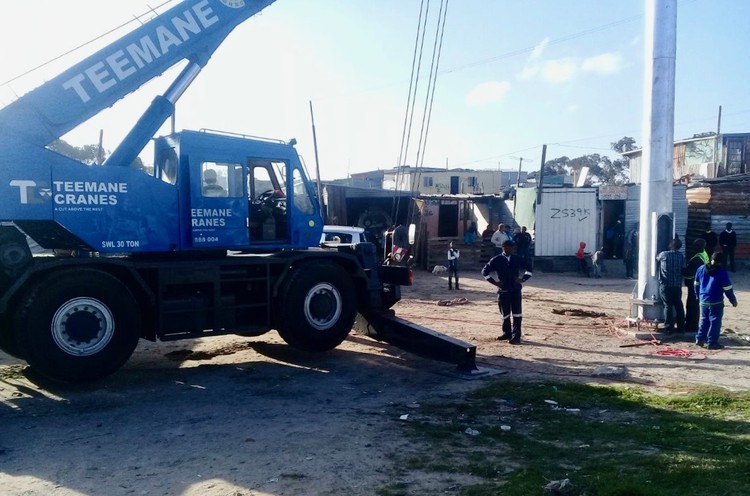
The City of Cape Town installed a light on top of one of nine masts in Marikana, Philippi, on Tuesday. Photo: Mary-Anne Gontsana
25 May 2018
Seven months after government promised to install mast lights in Marikana informal settlement in Philippi, no lights are working.
Residents say that a lack of street lighting is a significant contributor to crime in the area. They say the police find it too dark to patrol.
The City had promised nine mast lights by December, said community leader Loyiso Nkqintiza. Seven months later, there are nine masts and only one light, which was installed on Tuesday. The light was not working on Tuesday or Wednesday night, according to a resident.
Nkqintiza said meetings had taken place between residents and City officials, but no progress had been made on the lights.
Councillor Stuart Diamond, the acting mayoral committee member for informal settlements and energy said the City had to first obtain permission from landowners. “Permission was granted to erect five 30m high masts. However, the installation of four of the high masts requires the relocation of informal structures to make space for the mast bases to be installed. This is still being looked at. The position of one of
the bases is not affected and has been constructed already. It would have to be connected by Eskom.”
During a visit to the Philippi East police station in October 2017, Dan Plato, Western Cape Minister of Community Safety, told residents that because Marikana is on privately-owned land, the lights would be installed on the border of the informal settlement. He said, “We have brought the problem [of street lights] to the attention of the City of Cape Town. It is in the hands of the City.”
Also in October, ward councillor Mboniswa Chitha said, “Cops can’t work effectively in the dark.”
Marikana resident Nonkosi explained that Marikana is divided into three sections. “We were told that all of those sections would get lighting. We attended numerous community meetings last year where City officials told us that three lights would be installed by December.”
“Living in darkness is a huge problem for us especially in a crime-ridden area like this. Right now police are complaining that they cannot do patrols in Marikana because it is too dark. Crime is going up and up … It’s bad,” said Nonkosi.
“What’s weird is that after I spoke to you on Monday, I saw people from the City on Tuesday around 3pm, installing one light. No one was informed about this, not even our community leadership,” said Nonkosi.